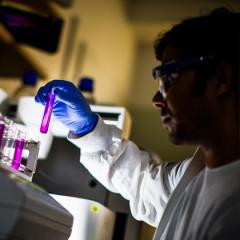New, personalised treatments for cancer and long COVID, groundbreaking oral vaccines, and tech that teaches our immune systems to kill bacteria are a step closer after a $4.5 million funding win for researchers at the Australian Institute for Bioengineering and Nanotechnology (AIBN).

The institute scored four wins in the latest National Health and Medical Research Council (NHMRC) Investigator Grant round for nanotechnology projects that could change the way we approach certain diseases.
A total 229 Investigator grants were awarded in the latest round, a prize pool worth $411 million. University of Queensland researchers accounted for 24 of these grants.
Immune dashboard chip

Dr Alain Wuethrich will use his $1.6 million Emerging Leader 2 grant to develop digital nanotechnology capable of detecting trace immune dysregulation from a pin-prick of blood.
He says understanding immune dysregulation is crucial for addressing emerging diseases like Long Covid and for future-proofing immune-modulating mRNA vaccines.
“The technology we have in mind will be 1000 times more sensitive than conventional methods,” Dr Wuethrich said.
“Hopefully, this will lead to a better understanding, diagnosis, and treatment of diseases like long COVID, and the development of personalised vaccines with greatly reduced side effects.”
Dr Wuethrich is one of two Investigator Grant winners currently working with Professor Matt Trau.
Early cancer detection
Dr Richard Lobb, will use his $670,400 Emerging Leadership 1 grant to develop bloody-based cancer detection technology f that is highly accurate and can be implemented in routine screening.

Dr Lobb, who also works with Professor Trau, says his project will allow him to digitally profile circulating brain-derived extracellular vesicles to monitor primary brain cancer and brain metastases.
“The outcome of patients with brain cancer is very poor, with limited options in determining if patients are responding to therapy.” Dr Lobb said.
“There is a clinical need to identify patients at early-stage risk of cancer metastases or progression. From a simple blood test, this project will give us new eyes into what is happening in the brain by providing the earliest possible information on response to treatment.”
Oral vaccine delivery
Dr Hao Song, meanwhile, has won a $1.6 million Emerging Leader 2 grant to develop a biomimetic mRNA oral vaccine delivery platform through materials innovation and formulation engineering.

Dr Song says the ultimate goal is to convert conventionally injected vaccines into oral tablets that are relieved of cold-chain management and better fit patient compliance.
“I anticipate that this project will uncover new knowledge on the rationale of mRNA oral vaccine design, leading to a market-relevant platform technology for mRNA oral vaccines with improved patient acceptability and wider accessibility.
“Through this project, I aim to contribute to Australia’s capabilities in mRNA vaccine development and manufacturing, provide a market ready vaccine candidate with great translational potentials, delivering both economic and social impact.”
Dr Song is one of two Investigator grant winners working with materials scientist Professor Chengzhong (Michael) Yu.
Tackling bacterial infection and antibiotic resistance

Dr Yue Wang, who also works with Professor Yu will use her $670,400 grant on nanotechnology that addresses the threat of bacterial infection and antibiotic resistance.
Dr Wang said the overarching aim of her Emerging Leader 1 grant is to custom design an advanced nanoplatform based on her silica-based nanoparticles that protect the gene, modulate metabolism, phenotype and translation, and improve gene delivery.
“This project will contribute to new antibiotic-free strategies in training macrophages to combat bacterial infection and will contribute to a paradigm shift in design principles for gene nanocarriers,” she said.
“I will also incorporate pharmacokinetic studies to ensure the safety of nanoparticles, further enhancing the potential for translation and future clinical use.”


